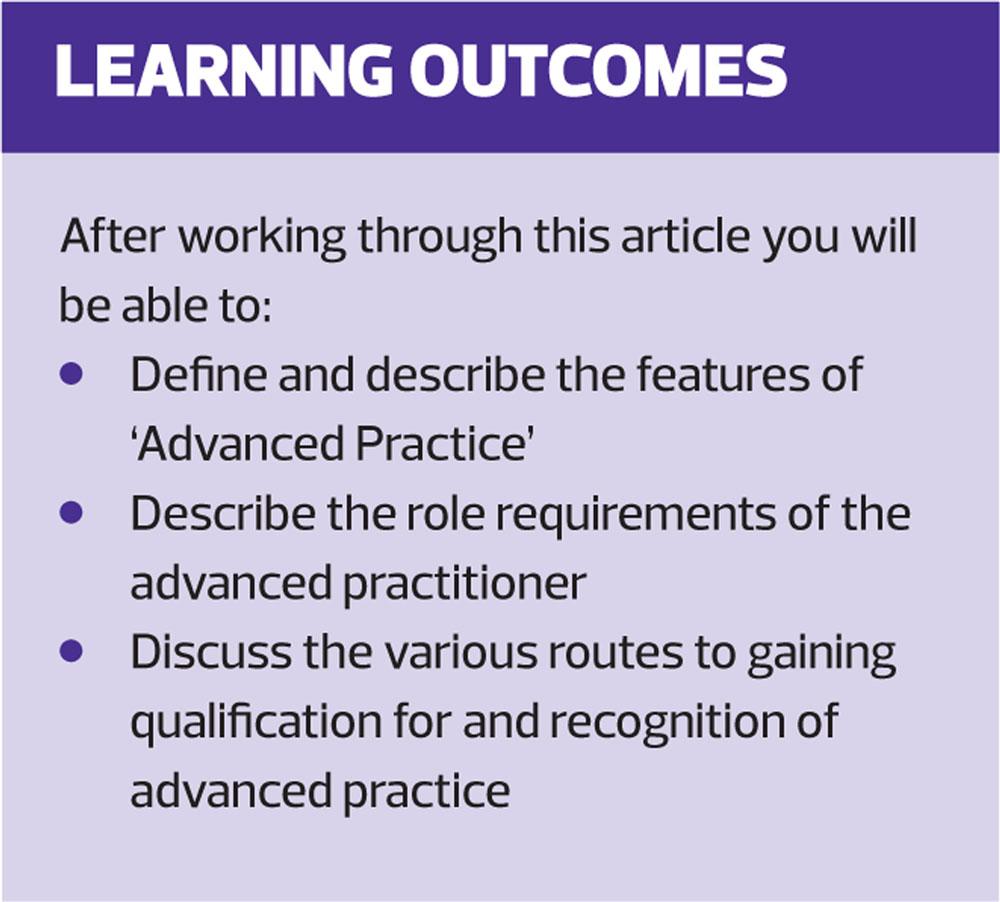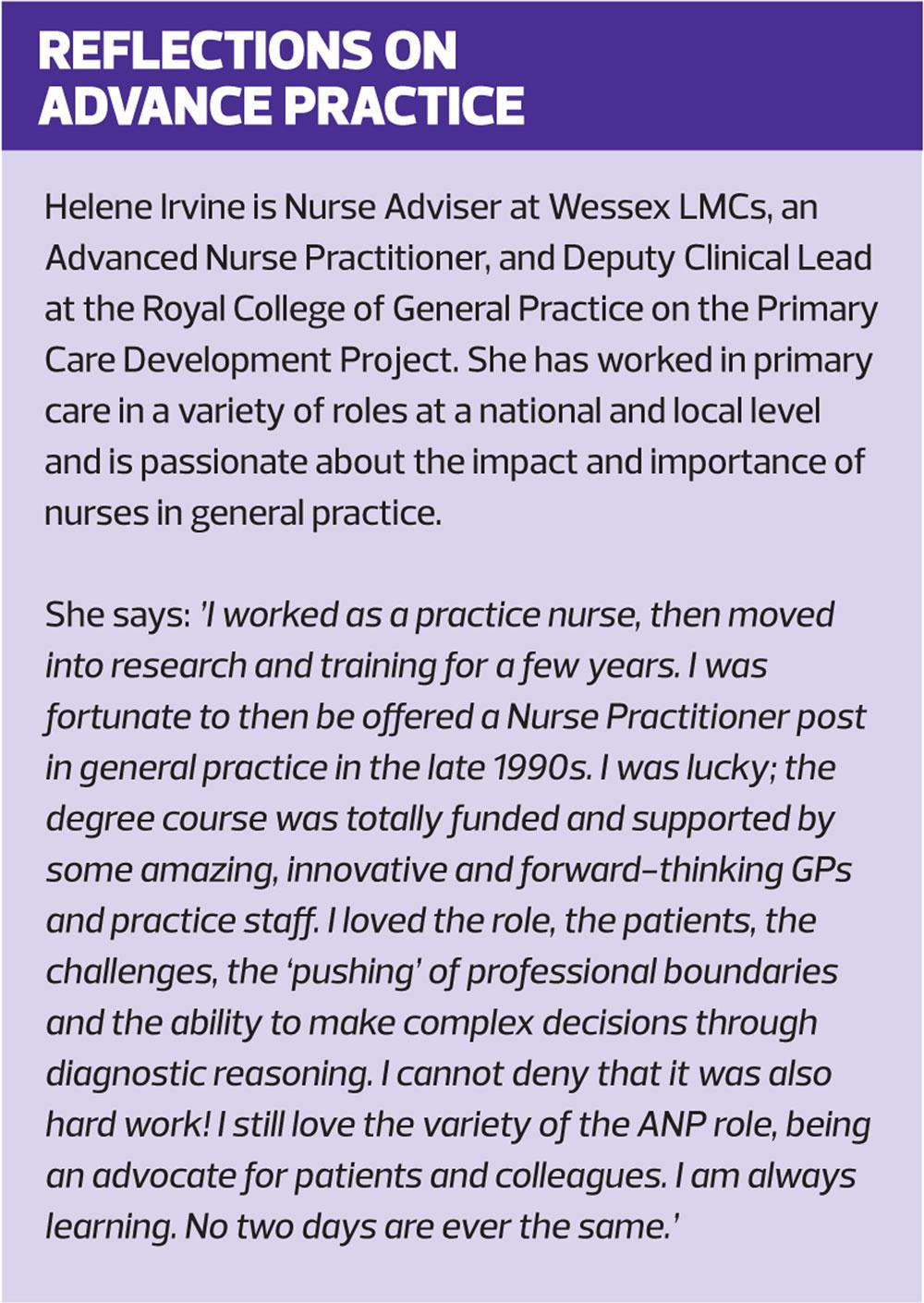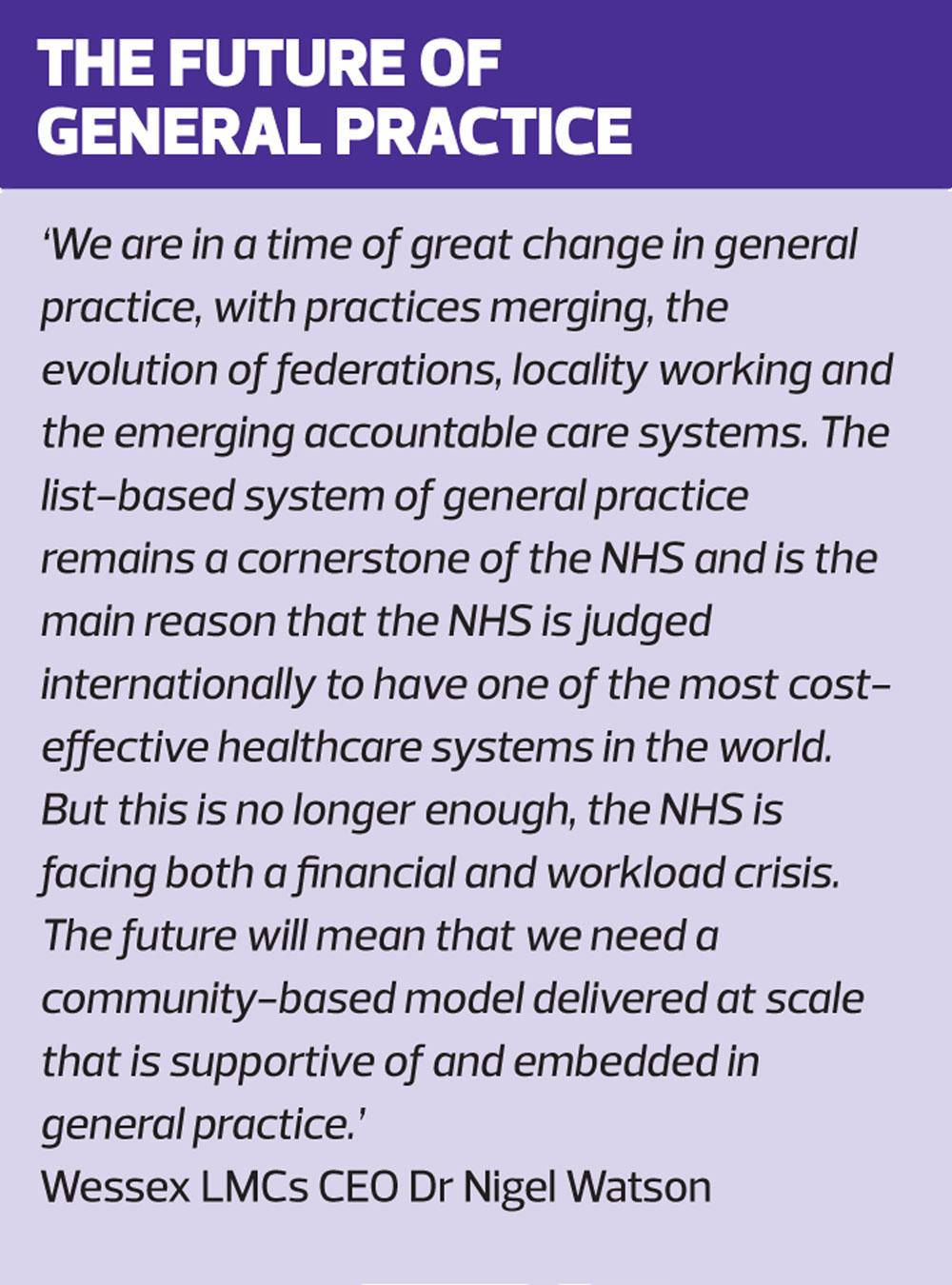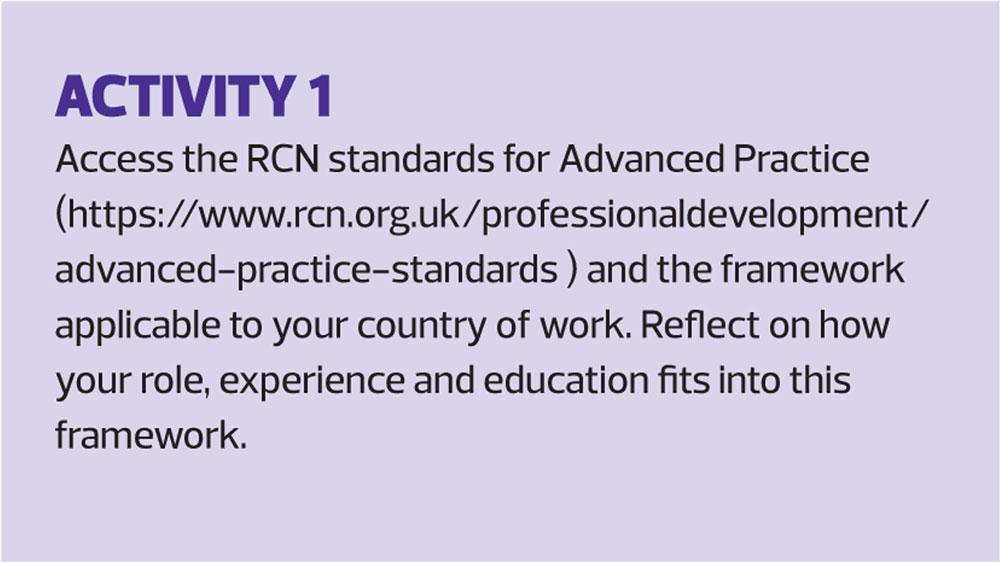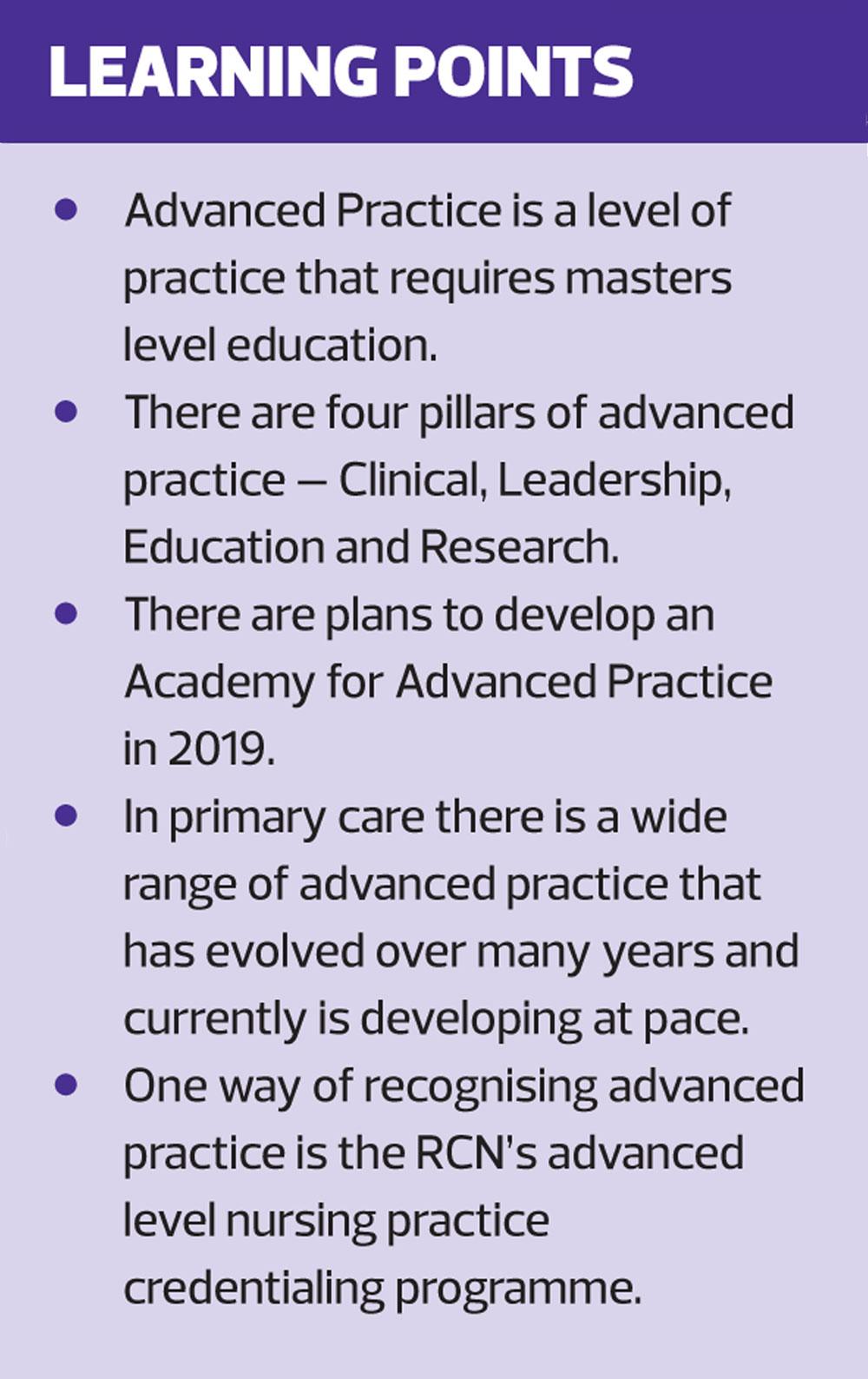
Advanced practice: where are we now and where are we going
Wendy Preston
Wendy Preston
RGN BSc(Hons) MSc (Respiratory) PGCertHE NMP
Head of Nursing Practice at the RCN, Honorary Respiratory Nurse Consultant, Advanced Nurse Practitioner in an out of hours general practice setting, Nurse representative on Health Education England’s Advanced Clinical Practice steering board
Helene Irvine
MA, Advanced Nurse Practitioner, BSc (Hons), Non-Medical Prescriber, NP Dip, Specialist Practitioner (Primary Care), PN, SCM, RGN
Nurses and Allied Health Professionals are extending and expanding their scope of practice beyond initial registration in all health care settings, developing their skills, competence and confidence. They are becoming ‘advanced practitioners’, but what does this mean and what does the future hold?
With an ever-increasing demand for health care and financially constrained budgets it has never been more important to have educated and competent staff, delivering the best care possible, at the right time for patients. Leadership and innovation are key to developing and delivering the right services and care, and improving health and wellbeing outcomes for people. Registered nurses and Allied Health Professionals (AHPs) are increasingly extending and expanding their scope of practice beyond their initial registration in all health care settings, and are developing their skills, competence and confidence.
This article gives an overview of advanced practice and explores some of the developments across a busy couple of years, as well as looking at the future for multi-professional advanced practitioners in England.
WHAT IS ADVANCED PRACTICE?
The Royal College of Nursing (RCN) defines advanced practice as: ‘… a level of practice, rather than a type or specialty of practice. Advanced practitioners are educated at master’s level in clinical practice and are assessed as competent in advanced practice using their expert knowledge and skills. They have the freedom and authority to act, making autonomous decisions in the assessment, diagnosis and treatment of patients.’ 1
What’s in a name?
The term ‘Advanced Practice’ defines the level of practice at which the nurse works. Advanced Practitioners are responsible for the safe delivery of a number of defined roles not routinely performed by nurses within primary care, and require competence in specific areas of knowledge, technical skill, nursing expertise and clinical decision-making. This advanced clinical role is, as yet, not regulated or specifically defined and this has the potential to compromise patient safety.
A study undertaken by Alison Leary and colleagues from South Bank University, involving trusts around the UK, analysed almost 18,000 ‘specialist posts’ in more detail.2 It found a total of 595 job titles, the most common of which were:
- Clinical nurse specialist
- Nurse specialist
- Advanced Nurse Practitioner (ANP)
- Nurse Practitioner (NP).
Of these, 323 posts (5.6%) had the title of ANP or specialist nurse but were not registered as such with the NMC. This obviously has implications in terms of public safety, and confusion for employers, colleagues and patients.
THE ADVANCED CLINICAL PRACTICE FRAMEWORK
Health Education England (HEE) launched the advanced clinical practice framework in November 2017.3
It states that registered nurses and AHPs working at advanced level:
- Are accountable practitioners, working at the boundaries of their profession
- Are innovative and highly skilled at assessing and managing risk, including prescribing for those professions that have authority
- Have the freedom and authority to act autonomously and independently
- Accept the responsibility for decisions made and actions taken
- Are very experienced and highly educated experts
- Are holistic practitioners, e.g. advanced nurses are able to address nursing as well as medical needs
- Have the skills, knowledge and ability to ‘see’ the whole person, fusing biomedical science with the art of caring, providing health promotion advice, counselling, assessment, diagnosis, referral, treatment and discharge
- Are increasingly seen as a solution to addressing workforce challenges, meeting the needs of an ageing population with an ever developing chronic disease profile.
CREDENTIALING
The RCN has set standards for advanced level practice nurses, accredited master’s programmes and introduced a Credentialing Programme. This includes independent assessment of education, practice and experience to measure if the standards are met. These standards can be viewed at https://www.rcn.org.uk/professional-development/advanced-practicestandards. Successful candidates are listed on a publicly available directory with a review period of three years.4 At the end of November 2018 the directory included 265 nurses from a wide range of nursing backgrounds, with over half being from primary care and community settings. Many of these nurses have agreed to take part in longitudinal research studies to measure outcomes of advanced practice and credentialing.
The RCN Advanced Level Nursing Practice Credentialing Program has four models:
- Master’s in Advanced Practice at an RCN accredited university (automatic initial credentialing)
- Master’s in Advanced Practice
- Master’s that is clinically related
- Does not have a Master’s but is able to demonstrate that they are practising at an advanced level and have health assessment and independent prescribing qualifications. An additional assignment is required that is academically assessed at masters level. This option is available until the end of 2020 to allow nurses with experience of advanced practice (usually multiple qualifications across the years as education has developed) to have their level of practice acknowledged.
ACADEMY OF ADVANCED PRACTICE
The concept of creating an Academy for Advanced Practice was discussed at the recent HEE Advanced Clinical Practice (ACP) conference in London. The proposed model is to engage with existing professional bodies and colleges to facilitate a central directory of advanced practitioners (multi-professional) who meet the standards defined in the existing advanced practice framework and education standards. Professional bodies would keep responsibility and control over their credentialing and accreditation programmes if such a model is developed.
Also discussed was how funding is currently changing with the introduction of the apprenticeship levy in England. Advanced clinical practice apprenticeship standards have recently been approved and many universities will be offering this option. The education continues to be a master’s level academic programme (usually one day per week for three years) with the addition of an end point assessment. There is a requirement to be in a formal trainee post with supervised practice and employer support. Recent changes to the Nursing and Midwifery Council standards mean that supervision during the non-medical prescribing training, which is part of the programme, can be provided by a nurse or AHP with prescribing competence; previously this needed to be a doctor. Clinical leadership is also essential for sustainability as well as career progression to, for example, consultant nurse or clinical lead.
Skill mix in primary care
Over the last 5–10 years, increasing numbers of other healthcare and allied professionals have been joining the primary care team, such as specialist nurses, Advanced Nurse Practitioners, pharmacists, paramedics, musculoskeletal (MSK) practitioners, care navigators, mental health workers and social prescribing practitioners. To add value to the primary care team and provision of care to patients, these individuals have developed their skills and knowledge to have a deeper understanding of disease processes, making a diagnosis and managing a variety of conditions that fall within their scope of practice and competencies.
SO WHAT DO WE KNOW?
Five million consultations take place in general practice each week, that’s 1 million consultations per day across the UK, and we are described as the front door of the NHS. Primary care in the UK is often referred to as ‘The Jewel in the Crown’ and revered by other countries. We also know that we have an ageing population and people presenting with comorbidities and complex needs which put demands on an ever-decreasing workforce. Some 50% of GP appointments are for patients with long term conditions.
A Queen’s Nursing Institute report in 2016 indicated that at least 33.4% of general practice nurses (GPNs) would be retiring by 2020.5 This is not a new revelation; it had been highlighted over 20 years ago. There are currently also major issues with the retention and recruitment of GPs. Anecdotal evidence would suggest that primary care would not be the first career choice for new trainee student nurses, though research has shown that exposure to primary care can influence their choice. If we are to make general practice a career option for nurses there needs to be clarity around roles, parity in terms of salary and terms of service, competencies, level of academic training and a career structure.
One way to address the issue of recruitment and retention is to make general practice a more attractive place to work and address parity between secondary care colleagues and other AHPs. Support and funding for continued professional development (CPD) is also essential; an area that GPNs have historically had difficulty accessing. For these issues to be addressed, appropriate funding for practices would be required.
Career profiling for GPs is now high on the agenda and we also need to consider this as an option for GPNs, to provide opportunities to use and develop transferable skills between primary and secondary care and different nursing disciplines. Locally we are starting to look at how this could be implemented.
The GP Five Year Forward View6 talks about: investment, workforce, workload, practice infrastructure and new models of care. It’s about wrapping services around GP practices, working at scale, addressing population needs and the development of locality hubs. The GPN 10 Point Action Plan7 identified that £15 million would be needed to address the retention and recruitment of GPNs as part of the 10 point action plan. The GP Five Year Forward View6 also states that there would be 5,000 more doctors and a further 5,000 other roles in primary care including:
- Nurses
- Physician associates
- MSK professionals
- Pharmacists and
- Mental health workers.
The traditional model was for GPs and nurses to be located in general practice, but this is also changing with a shift of roles and the associated skills of professionals moving from secondary into primary care, paramedics being an example. This can have a positive effect in terms of shared learning and appropriate utilisation of skills and knowledge, with the aim of having the right person in the right place at the right time for delivery of patient care. The new roles in general practice have had an impact and advanced practice has encouraged new ways of working. We still, however, need to support and develop the current GPN workforce. Other challenges are:
- Inter-professional relations
- Professional identities and boundaries
- The complexity and extent of the workload
- People’s response to change
- Access and support for CPD
- Supervision, and
- Salaries, including terms and conditions.
SO WHERE ARE WE GOING?
The nurse role has developed within general practice in response to extended clinical and patient demand, and workforce issues, and has been evolving over the last 20 years. It is now the norm for nurses to undertake ‘tasks’ that were traditionally done by doctors, such as taking the lead on long-term conditions, referrals to secondary care including radiology, and prescribing, among others. As workload increases there is a further push to enable and encourage health professional groups, including nurses, to expand their roles.
Roles, education and challenges
The HEE multi-professional framework for advanced clinical practice focuses on the following four themes:3
- Clinical/direct care practice
- Leadership and collaborative practice
- Improving quality and developing practice
- Developing self and others.
The expectation is that nurses working at advanced level will have achieved competence in these areas during extensive clinical/practice experience and following completion of Master’s level education/learning or its equivalent (for example through Master’s level postgraduate certificates/diplomas). The assurance is that all people working at an advanced level will have at least a minimum skill set and competencies. What we don’t want is duplication of tasks as this has consequences for yet more confusion in terms of demonstration of cost-savings and time.
What about those in the vanguard of advanced practice?
Some nurses will have been working at an advanced level and pushing the boundaries of the traditional practice nurse role before the much-needed HEE definition of advanced practice. The expertise and history of this vanguard, who have encouraged and enabled us to gain role recognition and the development of master’s level education, should be acknowledged.
This group is still providing a valuable and essential contribution to general practice and patients. They are an experienced and professional workforce and many fulfill the roles that are fading fast, such as mentors, educators, supervisors and ‘specialist roles’ around long term conditions. We need to support them and not disenfranchise the current workforce. We need to retain them and be creative about how their expertise and knowledge can be used by students, preceptorship nurses and the current workforce.
How easy will the process be to provide evidence for those nurses who are already working at an advanced level but at the time of qualifying did not have access to a master’s education as this provision was not available? Accessing an appropriate level of training, education and funding for CPD is, and always has been, an issue for many nurses employed in general practice. We may need to consider different ways for this group of nurses to provide evidence of their competency, level of knowledge and expertise. For example, could this process include an assessment by an external observer in their clinical area, in addition to written documentation and evidence? The degree apprenticeship route to advanced clinical practice may be a solution for some.
What about those people who have been assessed as advanced through the RCN credentialing route – another level of assessment? How do they compare with those that will have achieved a Masters? Will credentialing provide adequate evidence around good governance, a ‘quality mark’ and recognition of individual capabilities and experience through reassessment every three years?
How will we assess or measure the competencies of a newly qualified person with an MSc (novice) compared to someone with a Nurse Practitioner BSc degree who has been in practice for over 20 years (expert)? As Einstein said: ‘We need to keep things as simple as possible but no simpler.’
CONCLUSION
We are sure that the next couple of years are going to be as busy for advanced practice as the previous two. There is an appetite to develop advanced practice across professions to ensure standards are aligned and that the public can be assured of what ‘advanced’ means. This requires stakeholders such as arm’s length bodies – NHS England, Wales, Scotland and Northern Ireland, NHS providers, and HEE – and professional bodies to work together to develop alignment across professions, whilst valuing individual professions such as nursing. We are passionate regarding advanced practice, up for this challenge and are proud to be advanced practitioners in primary care.
REFERENCES
1. Royal College of Nursing. Advanced Practice Standards. 2018 https://www.rcn.org.uk/professional-development/advanced-practice-standards
2. Leary A, MacLaine K, Trevatt P, et al. Variation in job titles within the nursing workforce. Journal of Clinical Nursing 2017; 26(23-4): 4945-50
3. Health Education England. Advanced Clinical Practitioner Framework. 2017 https://www.hee.nhs.uk/our-work/advanced-clinical-practice
4. Royal College of Nursing. Advanced Level Nursing Practice Credentialing. 2017 https://www.rcn.org.uk/professional-development/professional-services/credentialing
5. The Queens Nursing Institute. General Practice Nursing in the 21st century: a time of opportunity. QNI 2016. https://www.qni.org.uk/wpcontent/uploads/2016/09/gpn_c21_report.pdf
6. NHS England. General Practice: Five Year Forward View, 2016 https://www.england.nhs.uk/wpcontent/uploads/2016/04/gpfv.pdf
7. NHS England. General Practice – Developing confidence, capability and capacity: A 10 point action plan for General Practice Nursing, 2018. https://www.england.nhs.uk/wpcontent/uploads/2018/01/general-practice-nursing-ten-point-plan-v17.pdf
